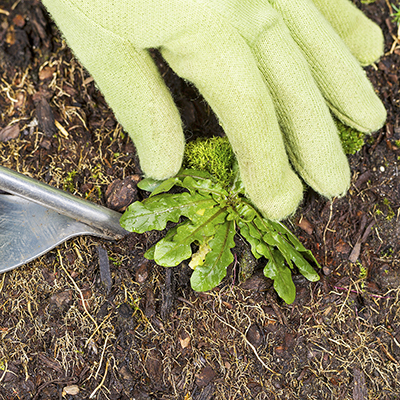Using Vinegar to Kill Weeds

Last updated January 29, 2025
It’s every gardener’s complaint: weeding. Just like cooks complain about washing dishes, gardeners fuss about managing weeds, whether that’s pulling weeds by hand or killing weeds with chemicals.
There are seemingly as many solutions for managing weeds as there are types of weeds. You can hand-pull weeds, use a variety of tools to chop them at their roots or pull them up out of the ground, lay down weed-blocking landscape fabric, or use methods like sheet mulching to suppress weeds.
Eventually, most gardeners look for chemical solutions to manage weeds. One of the most popularly searched methods is to use vinegar to kill weeds.
In this guide, we’ll look at using vinegar solutions to kill weeds in your home landscape.
Difficulty:
Beginner
Duration:
Under 2 hours
Table of Contents
How Weed Killers Work
How Vinegar Works to Kill Weeds
How to Use Vinegar to Kill Weeds
Ecological Concerns for Using Vinegar to Control Weeds
Long Term Weed Control
How Weed Killers Work

There are many ways to define weeds. Gardeners typically say a weed is a “plant out of place.” Weeds are plants that compete and persist in the landscape and take resources away from desirable plants.
Typical weeds include lawn weeds like crabgrass, knotweed and ragweed. Some plants are controversially categorized as weeds, like dandelions and wild violets, that benefit pollinators.
Weeds take over landscapes through setting seeds or spreading by underground roots structures like rhizomes, tubers and stolons. Frustratingly, some plants spread by multiple methods.
Weeds harm your garden by competing with your plants for water, light, nutrients and space. In addition, some weeds can be unattractive in a garden, can have thorns that will scratch you and your pets, and can displace native species.
There are many ways to control weeds. However, it’s easier to prevent weeds from taking root than it is to control weeds that have set seed. At best, weed control requires multiple strategies over many seasons.
Pre-emergent strategies include:
- Using mulch to suppress weeds. Mulch helps
your garden by retaining moisture. - Using pre-emergent herbicides.
- Using weed fabric barriers to suppress weeds.
- Using soil solarization to utilize the sun’s energy to kill weeds.
Post-emergent strategies include:
- Applying herbicides.
- Hand pulling with a rake or hoe.
- Using a propane fueled weed torch to sear the weeds. The advantage is it gets the roots. Effective for weeds in tight spaces like sidewalk cracks.
There are two types of post-emergent weed control chemicals: selective and non-selective. Selective herbicides work on certain types of plants. Non-selective herbicides are effective on all plants. There are few selective herbicides available to home gardeners. Instead, home gardeners must use non-selective herbicides carefully to kill weeds and protect the desirable plants.
Additionally, herbicides are classified as either systemic or non-systemic (also called contact). Systemic herbicides travel from the intake point like a leaf, to the root of the plant. Non-systemic herbicides stay at the point of contact. Vinegar weed killing products are both non-selective and non-systemic. They will kill the parts of the plants that they’re sprayed on, whether weeds or not. When using weed killing products like this, protect your non-target plants from over spray and drift.
Gardeners seeking "natural" alternatives to synthetic chemicals often look to vinegar for weed control. Vinegar can be used as a non-selective herbicide that kills weeds in your garden. Vinegar solutions are organic and will degrade in the soil. However, vinegar weed killers can be potent and must be used carefully to eliminate weeds.
How Vinegar Works to Kill Weeds

Vinegar kills weeds by breaking down the cell walls. This causes the plant to dry out. Because vinegar is a non-systemic herbicide, only the parts of the plant that are sprayed will die.
Different types of vinegar have varying levels of acetic acid. Household vinegar or distilled white vinegar, the kind you keep in your kitchen to cook with, is typically a 4 to 6 percent acetic acid concentration in water. This solution will kill tender young plants, but older weeds will need a higher concentration to effectively kill them.
The weaker vinegar solution is useful for killing tender, newly sprouted weeds in pavement or along sidewalk cracks.
For weed killing you can buy cleaning vinegar, sometimes called horticultural vinegar. This product has a 20 percent acetic acid concentration. Keep in mind that even though it’s an organic product, it’s a potent herbicide and you should follow label directions for use and storage.
Vinegar sold as weed killer provides non-selective control for herbaceous broadleaf weeds. It will kill whatever foliage you spray it on. Vinegar weed killer is non-systemic and will not kill plants to the root. Vinegar weed killers are not labelled to kill woody plants and tough vines.
Safety tips for using horticultural vinegar.
- Always use protective eyewear and gloves when working with cleaning vinegar. Avoid contact with eyes, skin and clothing.
- Be careful of inhaling the vapors. Use in outdoor spaces.
- Wear long sleeves, long pants, shoes, socks and gloves when using any herbicide, including horticultural vinegar.
- When applying the product, keep everyone away until it dries, especially children and pets.
How to Use Vinegar to Kill Weeds

Before you start managing weeds in your yard, learn to identify the weeds first.You may find that some weeds are beneficial in your landscape and you may be able to tolerate small amounts.
Vinegar weed killing products can be used on these common weeds:
- Bleck medic
- Cinquefoil
- Common chickweed
- Crabgrass
- Dandelion
- Foxtails
- Mugwort
- Mustard
- Oxalis (wood sorrel)
- Pigweed
- Plantain
- Quackgrass
- Ragweed
- Smartweed
How to Use Vinegar to Control Weeds
- For household vinegar solutions, simply fill a spray bottle with distilled white vinegar and apply it to the weeds. Let it dry and wait for the solution to work.
- If you’re using horticultural or cleaning vinegar, follow label directions, being careful to wear protective clothing and eyewear and to keep away from children and pets.
- The solution will kill weeds within two weeks. The product dries quickly and will not need to be reapplied if it rains.
- After treatment and the foliage dies, you’ll need to pull the dead plant out of the ground to ensure that it doesn’t start growing again.
Tip: Homemade weed killing recipes often include salt and dishwashing liquid to vinegar solutions. Experts recommend against using salt and soap products because they have the potential to damage plants and harm wildlife.
Ecological Concerns for Using Vinegar to Control Weeds

Vinegar is an organic product that will quickly degrade once it’s used. However, using vinegar in the garden can harm amphibians and beneficial insects.
Salt is a common additive in homemade weed killer recipes. Salt can damage your soil and harm plants and wildlife. Unlike vinegar, sodium (table salt) does not break down in soil. All plants, weeds and desirable plants, will not grow in soil contaminated with salt.
Liquid dish soaps are often included in homemade weed killer recipes to help the vinegar adhere to foliage. They are not toxic like salt, but soaps can remove the protective cuticle layer from plant foliage.
High concentrations of vinegar can affect soil pH. If you use vinegar weed killers, use sparingly.
Long Term Weed Control

Like with pest management, weed control in a garden is an ongoing multi-layered process. The most effective strategy is to do your best to prevent weeds from emerging and keep weeds in control during the season.
Hand-pulling weeds is always the best solution. Learn to identify weeds and get a handle on them before they get out of control. The best time to treat weeds is before they set seed. Mulch is an excellent weed suppressor. It has the added benefit of helping retain moisture in the soil.
There are times when vinegar weed control products and solutions are necessary. Always follow label directions when using herbicides like vinegar weed killers.
Killing weeds with vinegar is just one part of a weed control strategy. When you’re ready to manage weeds in your yard, look to The Home Depot for solutions. When you need the right tools and products, The Home Depot delivers online orders when and where you need them.



























